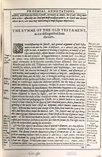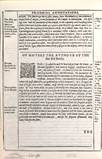…as it is distinguished from the new.
§1. Notwithstanding the subject, and general argument of both Testaments is one and the same in substance, as is already said, yet they differ in time, in manner of uttering of Mysteries, in variety of precepts and promises, also in means to observe the things exacted, and to attain to the end proposed. In regard whereof St. Hierom says: Lex Moysi et omne vetus instrumentum elementa mundi intelliguntur, quibus quasi elementis et Religionis exordiis Deum diseimus. The law of Moyses and all the old Testament are understood the elements of the world, by which, as by first rudiments and beginnings, we learn to know God. For that in it we have first the law of nature, and afterwards a law written, with promises of temporal rewards; as long life, and land flowing with milk and honey, and the like; but it brought nothing to perfection, as St. Paul says, when gifts and hosts were offered, which could not according to conscience make the observer perfect. For the helps of that time were but infirma et egena elementa: weak and poor elements. Likewise in general, touching the punishments that sometimes happened to the people of the old Testament, when they transgressed, the same Apostle affirmeth, that all the same chanced to them in figure, and are written for our correction, upon whom the ends of the world are come. So that the old Testament or Law, was but our pedagogue in Christ. Yet it setteth forth to us the whole course of God’s Church, for the space of four thousand years, that is, from the beginning of the world until Christ our redeemer, which Divines divide into six Ages, wherein was variety and change of her state, three under the Law of nature, and three others under the written Law. The seventh and last Age being this time of grace (wherein we now are) from Christ, to the day of general Judgement: as the world was made in six days, and in the seventh God is said to have rested, and therefore sanctified it, in other sort than the former six. The eight will be after the Resurrection, enduring for all eternity.
§2. Which six Ages of the ancient Church and old Testament, are thus distributed. The first from the Creation to Noe’s flood, contained the space of 1656 years. The second from the flood to the going of Abraham out of his country, 368 or counting Cainan (Gen. 11 juxta 72 and Luc. 3) 398. years. The third from Abraham his going forth of his country, to the parting of the children of Israel out of Aegypt. Which some count to have continued 720 years, others (whom we follow) but 430. And thus far in the law of nature before the written law. The fourth age dured 480 years, from the delivery of the children of Israel forth of Aegypt, to the foundation of the Temple in Hierusalem. The fifth Age was from the foundation of the Temple, to the captivity and transmigration of the Jews into Babylon, about 430 years. And the sixth Age dured about 640 years, from the Captivity of Babylon to Christ. In all which times God was acknowledged and rightly served, by a continual visible Church, with true religion; the same and no other, which now that Church holdeth, that is called and known by the name of Catholic. As we intend, by God’s assistance, to show by brief Annotations, concerning diverse particular points now in Controversy, as the holy Text gives occasion. And especially by way of recapitulation after every one of the six Ages, when we come to those passages in the History, where the same are ended.
Margin Notes
- §1. The old and new Testament differ in time. In manner of uttering. Variety of Precepts. Promises. Means.
- §1. The old Testament containeth figures of the new.
- §1. A continual visible Church from the beginning of the world to Christ.
- §1. The same Mystical body, but different in state.
- §2. Divided into Ages.
- §2. The first Age continued 1656 years.
- §2. The second 368 or 398.
- §2. The third about 430.
- §2. The fourth 480.
- §2. The fifth 430.
- §2. The sixth, near 640.
- §2. All the time from the creation to Christ about 4000 years.
Margin References
- §1. Tomo. 3 quest. 10. Algasia.
- §1. Hebr. 7. 9. 10. Gal. 4.
- §1. 1. Cor. 10.
- §1. Gal. 3.
- §1. Gen. 1. Gen. 8. Gen. 12. Genebrard. Chronolog. St. Aug lib. 15. ch. 8. civit. Gal 3. Exod. 16.


